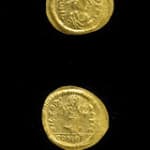Byzantine Gold Semissis of Emperor Maurice Tiberius, 582 CE - 602 CE
Gold
C.6738
Further images
Obverse: Diademed and Draped Bust of the Emperor Facing Righ Reverse: Victory Advancing Right, Looking Back Towards the Left, Holding a Wreath and Globus Crucige Maurice Tiberius was an active...
Obverse: Diademed and Draped Bust of the Emperor Facing Righ
Reverse: Victory Advancing Right, Looking Back Towards the Left, Holding a Wreath and Globus Crucige
Maurice Tiberius was an active and vigorous ruler, with a long-term plan for the empire, something his predecessor Tiberius had definitely been lacking. The new emperor reversed the centralization of Justinian and his successors. In the besieged west, he introduced the system of Exarchates, thus solidifying control over Italy, Sicily, and North Africa. An excellent military officer, Maurice gained a favorable peace with the Persians, ending a twenty years of war which had erupted when Justin II refused to pay the Persian King the tribute due him under the treaty agreed with Justinian. However, the Balkans proved to be the source of Maurice’s downfall. Unable to fend off the Slavs pushing over the Danube border, his underpaid and overstretched western army grew disenchanted with Maurice. When, in 602, the army was ordered to make their winter camp on the hostile north shore of the Danube, revolt broke out. A grotesque, half-barbarian junior officer by the name of Phocas was raised on a shield and proclaimed Augustus. Phocas marched on the capital where the senate confirmed his title. Maurice and his children were executed by henchmen soon after.
How many hands have touched a coin in your pocket or purse? What eras and lands have the coin traversed on its journey into our possession? As we reach into our pockets to pull out some change, we rarely hesitate to think of who might have touched the coin before us, or where the coin will venture to after it leaves our hands. More than money, coins are a symbol of the state that struck them, of a specific time and location, whether contemporary currencies or artifacts of a long forgotten empire. This stunning hand-struck coin reveals an expertise of craftsmanship and intricate sculptural detail that is often lacking in contemporary machine-made currencies. This magnificent coin is a memorial to the ancient glories of the Byzantine Empire passed down from the hands of civilization to civilization, from generation to generation.
Reverse: Victory Advancing Right, Looking Back Towards the Left, Holding a Wreath and Globus Crucige
Maurice Tiberius was an active and vigorous ruler, with a long-term plan for the empire, something his predecessor Tiberius had definitely been lacking. The new emperor reversed the centralization of Justinian and his successors. In the besieged west, he introduced the system of Exarchates, thus solidifying control over Italy, Sicily, and North Africa. An excellent military officer, Maurice gained a favorable peace with the Persians, ending a twenty years of war which had erupted when Justin II refused to pay the Persian King the tribute due him under the treaty agreed with Justinian. However, the Balkans proved to be the source of Maurice’s downfall. Unable to fend off the Slavs pushing over the Danube border, his underpaid and overstretched western army grew disenchanted with Maurice. When, in 602, the army was ordered to make their winter camp on the hostile north shore of the Danube, revolt broke out. A grotesque, half-barbarian junior officer by the name of Phocas was raised on a shield and proclaimed Augustus. Phocas marched on the capital where the senate confirmed his title. Maurice and his children were executed by henchmen soon after.
How many hands have touched a coin in your pocket or purse? What eras and lands have the coin traversed on its journey into our possession? As we reach into our pockets to pull out some change, we rarely hesitate to think of who might have touched the coin before us, or where the coin will venture to after it leaves our hands. More than money, coins are a symbol of the state that struck them, of a specific time and location, whether contemporary currencies or artifacts of a long forgotten empire. This stunning hand-struck coin reveals an expertise of craftsmanship and intricate sculptural detail that is often lacking in contemporary machine-made currencies. This magnificent coin is a memorial to the ancient glories of the Byzantine Empire passed down from the hands of civilization to civilization, from generation to generation.





